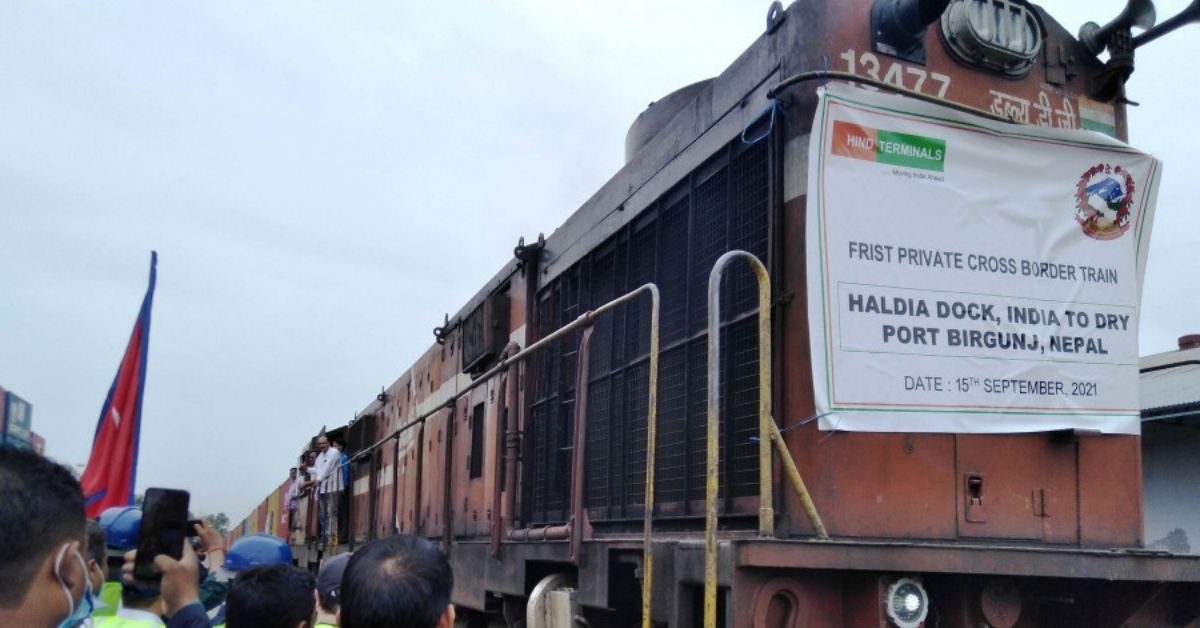The first private container train from India pulled into Sirsiya dry port in Birgunj on Wednesday, marking the end of the 17-year-old monopoly of state-owned Container Corporation of India on rail operations to Nepal.
Two months ago, the Nepal-India railway service agreement had been amended allowing entry to the private sector.
The container train operated by Hind Terminals reached Birgunj at 10:15 am with a cargo of food items, 40 hours after leaving Haldia dock near Kolkata.
“The first container train operated by India’s private sector arrived with 88 freight rakes laden with cargo imported by Nepali traders from third countries,” said Ashish Gajurel, executive director of the Nepal Intermodal Transport Development Board, the government agency responsible for the construction and operation of the dry port.
Abhinav Gupta, general manager of Hind Terminals, said as per the demand of Nepali importers, they will be operating services twice a week connecting Birgunj from Kolkata and Haldia. “The entry of Hind Terminals has ended the monopoly of Container Corporation of India (CONCOR).”
CONCOR, a subsidiary of Indian Railways, has been operating rail services to the inland clearance depot in Birgunj since 2004.
Gupta said that the entry of the private sector would eventually benefit Nepali traders because of competition between Indian state-owned and private companies. “As other private companies are also eager to connect Nepal, the market will see fierce competition, which will bring down shipping costs heavily.”
According to him, the cargo containers operated by Hind Terminals belong to MSC Mediterranean Shipping Company, a Swiss-based global shipping company.
Birgunj is a major trade gateway for Nepal, and handles 38 percent of Nepal’s total trade which is worth Rs1.68 trillion including exports of Rs1.53 trillion and imports of Rs144 billion.
“Cargo services will not only see competition that will bring down freight charges, but Nepali traders will also save time,” said Chudamani Sharma, information officer at the Birgunj Dry Port Customs Office.
Expensive delays have been a longstanding complaint of Nepali traders. Their goods are often stranded at Kolkata port for lack of railway rakes or congestion at the port, making trade with third countries difficult.
“The launch of the private railway service is likely to increase efficiency as well as cost-competitiveness, eventually benefiting the Nepali consumer as prices of goods will drop,” said Sharma.
This has been made possible by the amendment to the railway service agreement between Nepal and India. On July 9, 2021, the two countries made a formal exchange of Note Verbales as well as signed copies of the Letter of Exchange for the amendment to the rail accord.
Following this Letter of Exchange, all cargo train operators in India have been authorised to utilise the Indian Railways network to carry all containers bound for Nepal, whether bilateral freight between India and Nepal or third country freight from Indian ports to Nepal.
These operators of cargo trains include operators of public and private container trains, special freight trains, automobile freight trains, or any other operator authorised by the national transporter.
When the freight train service agreement was finalised in 2004, CONCOR was the sole container train operator. In 2006-07, Indian Railways opened up the market, allowing other operators to run container trains.
Since then, several companies including those backed by the Adani Group, Port of Singapore Authority and Dubai Port World and others have entered the fray.
Chandra Ghimire, former secretary at the Ministry of Commerce, Industry and Supplies, has written in his recent article in the Post that CONCOR seemed to have all the standard features of an inefficient government-owned company, due to which the Nepali trade fraternity suffered.
“The cost and time involved in the evacuation of Nepali cargo in transit routes remain pretty high compared with many South Asian countries. Traders complain of the unavailability of rakes. The recent amendment is an essential breakthrough in this regard, as it helps end the monopoly,” Ghimire wrote.
Any authorised cargo train operator from India, whether government owned or privately owned, can now transport Nepali cargo. The door has also been opened to Nepal Railway-owned trains to conduct services. Nepali operators intending to engage in the evacuation of Nepali cargo to and from Indian seaports will now be allowed to do so.
As per Subodh Kumar Gupta, president of the Birgunj Chamber of Commerce and Industry, there are three advantages—it will increase competition, reduce shipping costs and save time—all of which will eventually benefit consumers.
Source : Kathmandu Post







